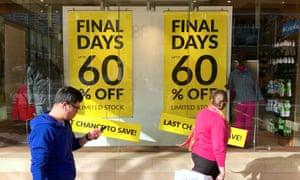Consumers aren’t stupid. They’re keeping their heads down and preparing for a long, difficult winter
This week came news via the treasurer’s Twitter account
that so far “1.1 million tax returns have been lodged compared to
around 600,000 at the same time last year”. He trumpeted this as
evidence of the desire for tax cuts “despite Labor opposition” (so much
for the ALP’s strategy of supporting the tax cuts to avoid being accused
of blocking them).
So, good news. People are getting tax cuts and we should all be feeling good.
And then came news that the latest Melbourne Institute-Westpac Index of Consumer Sentiment fell 4.1% in July to 96.5. The survey also saw consumers’ outlook on economic conditions over the next 12 months fall 12.3% in just one month.
More consumers are now pessimistic than optimistic, and it is the first time the index has been below 100 since late 2017. It rather puts a dampener on beliefs that with the LNP election win consumer confidence will drive us back to strong economic growth.
People aren’t completely stupid. They might fall for a lie during an election campaign but you can’t make them believe that their current situation is better than it really is.
One interesting aspect is that in June Coalition voters’ consumer sentiment jumped (this often happens after an election) but this month even their sentiment fell 7.5%.So, good news. People are getting tax cuts and we should all be feeling good.
And then came news that the latest Melbourne Institute-Westpac Index of Consumer Sentiment fell 4.1% in July to 96.5. The survey also saw consumers’ outlook on economic conditions over the next 12 months fall 12.3% in just one month.
More consumers are now pessimistic than optimistic, and it is the first time the index has been below 100 since late 2017. It rather puts a dampener on beliefs that with the LNP election win consumer confidence will drive us back to strong economic growth.
People aren’t completely stupid. They might fall for a lie during an election campaign but you can’t make them believe that their current situation is better than it really is.
Who would have guessed tax cuts and an LNP victory would not be seen as economic nirvana?
It is almost as though consumers saw the Reserve Bank cutting the cash rate from 1.5% to 1.0% in June and July as a sign that it is a good time to keep their heads down and stock up for a long winter.
The major problem remains the utter inability of the government to countenance pursuing any stimulus measures that might affect the budget surplus forecasts.
Speaking to Katharine Murphy, the treasurer suggested the stimulus versus surplus question was “a false choice”.
Speaking as a man determined to have his cake and eat it, even if that means more Australians go without cake, he argued that “we will deliver the surplus as committed to the Australian people. At the same time, we will continue to manage the Australian economy as it grows. We are boosting household incomes with a significant tax package, we are going to get infrastructure spending out the door, consistent with our budget and election promises.”
Except those infrastructure spending plans, tax cuts and election promises were the ones in place when the RBA decided it needed to cut the cash rate to 1.25% and then 1.0%.
They were the ones in place when the governor of the Reserve Bank told an audience in Darwin earlier this month that “over recent times I have been drawing attention to the fact that, as a nation, there are options other than monetary easing for putting us on a better path”.
Governor Lowe noted “one option is fiscal support, including through spending on infrastructure. This spending adds to demand in the economy and – provided the right projects are selected – it also adds to the country’s productive capacity. It is appropriate to be thinking about further investments in this area, especially with interest rates at a record low, the economy having spare capacity and some of our existing infrastructure struggling to cope with ongoing population growth.”
He doesn’t need to say that if he already believes the government’s current infrastructure plans are sufficient.
The surplus fetish, in my mind, is without doubt the biggest failure of Australian macroeconomic policy of the past quarter of a century.
A budget surplus tells us absolutely nothing about how well the government is handling the economy. It tells us nothing about wages growth or household living standards, or the provision of government services or the situation of those trying to find work or who are disabled.
It measures nothing of importance but it allows the government to wheel out spin, such as Frydenberg’s line in an interview on Sky News this week that “we believe that future generations should not be picking up the tab for the last, and that means we need to be fiscally responsible.”
This from a man who has just presided over tax cuts that are being paid for by dreams of economic sunshine and rainbows for the next decade.
When it comes to tax cuts that benefit the wealthy, who cares about paying the bill? But when it comes to assisting the economy to ensure (as Phillip Lowe noted) the benefits of stimulus are more “evenly distributed across the community”? Sorry, we need to cling to that surplus to prevent future generations picking up the tab – those same future generations whose ability to access public services will now be much less due to the reduction of the tax base.
But when you have a political and media system that cares more about a budget surplus now than the provision of public education and health in 10 years time, you end up with our current situation.
- Greg Jericho writes on economics for Guardian Australia

No comments:
Post a Comment